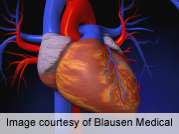Increased QRS duration on ECG tied to cardiovascular mortality

(HealthDay)—Increased QRS duration on electrocardiogram (ECG) is an independent predictor of cardiovascular mortality, according to a study published in the Sept. 1 issue of The American Journal of Cardiology.
Apurva Omkar Badheka, M.D., from the University of Miami, and colleagues retrospectively reviewed prospectively collected data from the National Health and Nutrition Examination Survey data set to identify 8,527 patients (mean age, 60.5 years; 87 percent white; 53 percent women) with ECG data available.
The researchers found that over 106,244.6 person-years of follow-up there were 1,433 cardiovascular deaths. After adjusting for established risk factors, the highest quartile of QRS duration was associated with significantly higher cardiovascular mortality than the lowest quartile (hazard ratio [HR], 1.3). There was also a significant association between both left bundle branch block (BBB; HR, 2.4) and right BBB (HR, 1.90) and increased cardiovascular mortality. There was an overall net reclassification improvement of 4.4 percent with the addition of the QRS duration in 10-millisecond increments to the Framingham Risk Score model.
"A model including QRS duration in addition to traditional risk factors was associated with improved cardiovascular risk prediction," the authors write.
More information:
Abstract
Full Text (subscription or payment may be required)
Copyright © 2013 HealthDay. All rights reserved.

















